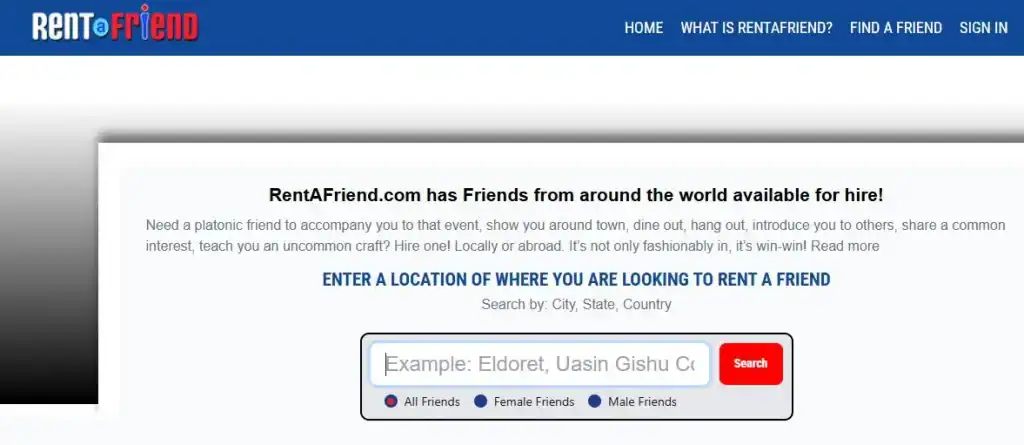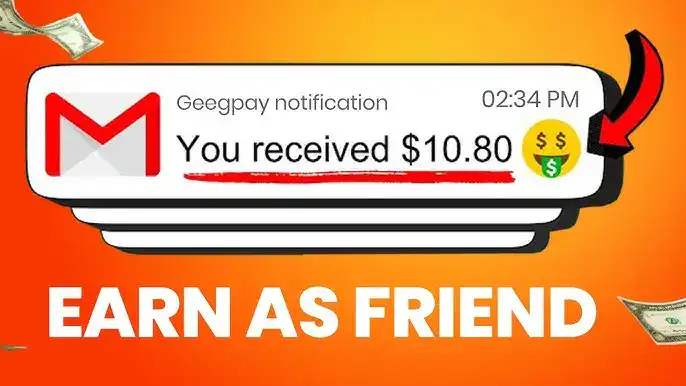In a world that’s becoming increasingly digital and lonely, the idea of get paid to be a friend is no longer just a quirky concept but a real, thriving side hustle.
From chatting with someone over coffee on Zoom to offering companionship through text or video calls, people are now earning up to $50 an hour simply by being kind, present, and supportive.
Whether you’re naturally social, enjoy deep conversations, or have a knack for making others feel heard, this modern gig economy is opening doors for anyone who wants to get paid to be an online friend or even a virtual friend in real time.
In this guide, we’ll show you exactly how to get paid to be a friend, explore the best platforms to start with, and why people are seeking these services in the first place.
But before we dive into the legit ways, let’s first understand who can do this and why there’s demand in the first place.
And because many people are feeling lonely every day, a few months ago, I decided to write this blog on how to earn a side hustle as you talk to lonely people.
Who Can Be an Online Friend?
Almost anyone with empathy, communication skills, and a stable internet connection can qualify to get paid to be a friend.
Unlike traditional jobs, this one doesn’t require degrees or specialized experience; just emotional intelligence and the ability to engage genuinely.
You can be:
- A stay-at-home parent looking for flexible income
- A college student with free hours and social energy
- A retiree with wisdom and time to share
- Someone recovering from burnout and seeking a low-stress gig
Most platforms offering opportunities to get paid to be an online friend focus on providing companionship, advice, or simple conversation.
That means extroverts, good listeners, and empathetic individuals are in high demand. Your value lies in your ability to make someone feel less alone.
Why Do People Hire Virtual Friends?

Hiring a virtual friend is becoming more common as people face increasing levels of loneliness, stress, and social isolation.
From emotional support to simple companionship, there are many reasons why someone might seek to get paid to be a virtual friend.
Let’s now break down the key motivations behind this growing demand.
Emotional Support in Times of Need
Life gets overwhelming sometimes. Whether it’s dealing with personal loss, burnout, or everyday stress, many people just want someone to talk to—a listening ear without judgment.
Virtual friends provide a comforting space where clients can vent, share their day, or express feelings without fear of being misunderstood.
Unlike therapy, which can be clinical or expensive, virtual friendship feels more casual and accessible. This makes it easier for people to open up, especially if they’re going through tough times but don’t necessarily need clinical intervention.
Also, not everyone has a strong social circle. People new to a city, recently divorced, or estranged from family may feel deeply alone.
Having someone to check in with regularly—even virtually—can significantly improve mental well-being.
Support for Social Anxiety and Shyness
Many people struggle with social anxiety or are naturally introverted. Forming connections in person can feel draining, awkward, or even terrifying.
That’s where virtual friends come in—offering the safety of connection without the pressure of face-to-face interaction.
Online friendships allow anxious individuals to build social confidence at their own pace. They can practice communication, learn how to read social cues, or simply enjoy the comfort of a conversation from behind a screen.
For these clients, hiring a virtual friend can be a stepping stone toward developing better social skills and eventually forming in-person relationships.
You’re not just chatting; you’re helping someone grow emotionally.
Coping with Life Transitions
Life changes like moving to a new city, starting college, changing careers, or going through a breakup can leave people feeling adrift.
In these moments, having a reliable, friendly presence—even virtually—can offer stability and reassurance.
Virtual friends help clients adjust to new circumstances. You might listen to someone talk about their first week at a new job or encourage them as they navigate living alone for the first time.
Your support can bring comfort and clarity when they need it most.
And because you’re not part of their regular life, clients often feel free to share more openly than they would with family or close friends.
Compare: Can You Really Get Paid to Walk?
Interest in Cultural Exchange or Language Practice
People around the world are fascinated by other cultures, languages, and lifestyles.
Some hire virtual friends specifically to engage in cultural exchange or practice speaking a foreign language in a friendly, low-pressure environment.
If you’re bilingual or have an interesting cultural background, you might find yourself in demand.
Clients love learning about customs, food, traditions, and everyday life in other countries.
These virtual connections become both educational and entertaining, and they’re an excellent example of how the internet is shrinking the world, one conversation at a time.
Need for Accountability and Motivation
Believe it or not, many people get paid to be a friend by simply helping others stay on track with their goals.
Virtual friends can serve as accountability partners for everything from fitness routines to daily journaling.
Clients often book check-ins to stay motivated, break bad habits, or stick to a plan.
Having a supportive friend who celebrates wins and encourages consistency can make all the difference.
This type of friendship is especially helpful for freelancers, students, or remote workers who may lack daily structure or encouragement.
15 Legit Ways to Get Paid to Be a Friend
Suppose you’re ready to get paid to be a friend. In that case, the good news is that there are numerous genuine platforms and creative side hustles where people can earn money simply by offering companionship, conversation, or emotional support.
Whether you prefer online interactions or in-person meetups, these 15 legit ways can help you turn your friendliness into a flexible income stream. Some of them even pay up to $50 an hour!
Let’s explore the best options to help you get paid to be an online friend or a virtual friend today.
1. Rent a Friend

Rent a Friend is one of the most well-known platforms where you can get paid to be a friend in both in-person and online formats.
On this platform, users rent companions for platonic activities like attending events, grabbing coffee, or simply chatting.
You create a profile listing your interests and availability, and clients choose who they want to spend time with. You can charge your own hourly rate, which often ranges from $20 to $50 per hour.
It’s not dating—just friendly interactions. This makes it a popular choice for people looking for lighthearted companionship. And if you’re not comfortable with in-person meetups, you can offer virtual friendship via video chat, texting, or voice calls.
Rent a Friend pays directly through your chosen method, and you keep 100% of your earnings since there’s no middleman fee. This flexibility and control make it one of the most reliable platforms to start with.
2. Papa
Papa connects friendly, compassionate people—called “Papa Pals”—with older adults who need companionship and help with everyday tasks.
While the primary goal is providing non-medical assistance like grocery shopping or running errands, much of the job is simply spending time with someone who feels lonely.
You might chat, go for a walk, or assist with light tech support.
Papa pays about $15–$20 per hour, and you’re paid weekly. You can set your schedule and choose assignments near your location, though virtual opportunities are sometimes available too.
If you’re someone who enjoys helping others—especially seniors—this is a meaningful way to get paid to be a virtual friend and brighten someone’s day.
3. Fiverr (Friendship Gigs)
Fiverr isn’t just for graphic designers and freelancers—it’s also a place where people pay for virtual companionship. You can create a custom “gig” that offers a 30-minute or 1-hour chat session via text, phone, or video.
Clients use these services to vent, talk about their day, or just pass time with someone friendly. If you market yourself well, you can charge anywhere from $10 to $50+ per hour depending on your reviews and delivery.
This is one of the easiest platforms to start on if you’re already comfortable using Fiverr or freelancing sites. Plus, the platform provides built-in traffic, which increases your chances of being discovered.
Just be sure to set clear boundaries and expectations in your gig description to ensure a safe and enjoyable experience for both sides.
4. FriendPC
FriendPC is a fast-growing platform that allows users to sign up as virtual friends, life coaches, or even virtual girlfriends/boyfriends—strictly platonic unless otherwise specified.
You can create a detailed profile listing what type of companionship you offer, such as emotional support, chatting, accountability, or gaming buddy sessions.
You get to set your own rates and choose how you want to interact (text, video chat, or voice calls).
Payments are handled through the platform, and you receive your cut after their commission. Many users report earning $25–$40 per hour once established.
FriendPC is ideal if you want to build a long-term online presence and get paid to be an online friend consistently.
5. Hey VINA (for Women)

Hey VINA is often called “Tinder for (girl) friends.”
While the app is primarily designed to help women find other women to connect with, influencers and micro-creators have started monetizing their profiles through affiliate partnerships and one-on-one meetups.
If you’re a woman looking to connect, empower, and potentially build paid opportunities through online friendships, Hey VINA can be a great lead generator. From there, you can offer private chat sessions or mentorship for a fee.
You won’t get paid directly through the app, but it’s a great place to build a brand around your friendly personality and convert those relationships into paid connections via platforms like Instagram, Calendly, or Patreon.
6. RentALocalFriend
RentALocalFriend is a unique global platform that allows people to connect with locals for personalized experiences—like exploring a city, attending cultural events, or learning a new skill.
As a local friend, your job is to provide genuine, friendly company while showcasing your area.
This platform is especially ideal if you live in a city or tourist destination. You can list yourself with an hourly rate, your interests, languages you speak, and the experiences you offer.
It’s like being a tour guide, but with a laid-back, friendlier twist.
While many sessions are in-person, the platform has also expanded to include virtual meetups.
This means you can get paid to be a virtual friend even from home—by giving virtual tours, language lessons, or casual cultural exchanges via video call.
Earnings vary depending on your rates and client demand, but some users charge upwards of $30–$60 per hour for unique, personalized experiences.
You have the flexibility to choose your hours, your services, and your pricing.
It’s a great option if you’re passionate about your city, love meeting new people, and want to turn your personality into profit.
7. Freelancer Platforms (Upwork & Freelancer.com)
Sites like Upwork and Freelancer.com aren’t traditionally used for friendship gigs, but they’ve evolved to include lifestyle and human interaction categories.
Here, people post jobs looking for emotional support, accountability partners, language partners, or conversational practice.
You can create a profile as a “virtual companion,” “friendly listener,” or “online friend,” and pitch your services to clients worldwide.
Unlike Fiverr, which requires you to list gigs, Upwork lets you apply to posted jobs directly.
Many of these jobs pay $15 to $40 per hour, and the more experience and reviews you gather, the higher your rates can go. You also have more freedom to choose long-term vs. one-off engagements.
Upwork especially attracts clients from corporate or professional settings, so if you have a background in counseling, coaching, or wellness, this could be a very lucrative path to get paid to be a friend.
Just keep in mind that competition can be stiff, so make your proposals friendly, personal, and professional. Show empathy in your communication—people aren’t hiring a robot; they’re hiring someone they want to talk to.
8. Simbi (Skill & Service Exchange)
Simbi is an online community that allows users to trade services, including virtual companionship, for credits rather than cash.
While it’s not direct money, you can exchange your “friendship services” for other valuable services like graphic design, writing, or even business coaching.
You can also build a reputation on the platform and eventually use that credibility to promote paid services off-site, such as offering video chat sessions through Calendly or payment links like PayPal or Stripe.
This platform is great for practicing your friendship gigs, gathering testimonials, and fine-tuning your offer before launching on cash-paying platforms like FriendPC or Fiverr.
Another upside is the community. Simbi users are supportive and genuinely interested in human connection, so if you’re just getting started and want to feel things out in a pressure-free space, this is ideal.
While Simbi may not help you earn $50 per hour right away, it offers indirect value that can lead to paid gigs, networking opportunities, or skill exchanges worth much more.
9. ChatOperatorJobs
If you’re comfortable chatting via text or email, platforms like ChatOperatorJobs offer paid opportunities where you can get paid to be an online friend by engaging in simple, friendly text conversations.
These jobs usually involve entertaining, keeping users company, or just chatting casually to reduce loneliness. You don’t always need to show your face or voice—just your personality through words.
Pay rates vary between $0.10 and $0.50 per message sent, which can add up to $15–$25 per hour, depending on how quickly you type and the volume of conversations.
Some jobs pay flat hourly rates for maintaining a certain number of conversations.
While some platforms can lean into flirtation or fantasy chats, many are strictly platonic and allow you to choose the kind of interactions you’re comfortable with.
It’s one of the more flexible ways to earn without needing to video chat or meet in person—and ideal for introverts who still want to help others feel heard and connected.
10. Reddit (r/slavelabour or r/freelance)
Reddit may not be a traditional job board, but its communities—especially subreddits like r/slavelabour, r/freelance, or r/forhire—often feature requests for virtual companionship, friendly chat sessions, or even emotional support roles.
Many users post job listings asking for a buddy to talk to, someone to listen to their story, or a companion to help with motivation.
These gigs typically pay via PayPal, Venmo, or crypto, and the rates range from $10 to $40+ per session, depending on the complexity and time required.
To succeed here, you’ll need to be proactive. Respond to posts quickly, write a friendly introduction, and be transparent about what you offer and what you’re comfortable with.
The casual nature of Reddit makes it less formal, but also riskier, so always vet your clients and clarify expectations before starting.
Over time, if you build trust and repeat clients, Reddit can become a valuable lead source. You can even redirect happy clients to platforms like Fiverr or FriendPC for more structured sessions.
This route is especially good if you want to test the waters without creating full profiles or joining formal platforms right away.
11. Premium.Chat

Premium.Chat is a powerful tool that lets you monetize one-on-one chats or video calls without needing a middleman platform.
It’s ideal for people who want to get paid to be a virtual friend on their own terms.
You create a profile and set your rates per minute for chat or video sessions. You then share your unique link on your website, blog, social media, or even Reddit and forums.
Clients click the link, pay upfront, and start chatting or calling you. There’s no need to worry about invoicing—Premium.Chat handles all that for you.
It’s best suited for people who already have some kind of online presence or following, but even beginners can get started by promoting their link creatively in communities where people seek online friendships or emotional support.
This platform is especially popular among people offering life advice, companionship, or even accountability check-ins.
And since you set the rate (some people charge up to $1.50/minute), you can realistically earn $50 or more per hour.
For those serious about creating a paid friendship business, Premium.Chat offers a professional, scalable solution with full control.
12. TikTok or Instagram (With a Personal Brand)

If you’re comfortable being on camera and have a friendly, magnetic personality, building a personal brand on TikTok or Instagram can open doors to get paid to be a friend in creative ways.
Content creators often gain a following by sharing relatable stories, motivational advice, mental health support, or “spend a day with me” style videos.
As your following grows, you can monetize your audience by offering paid one-on-one chats, check-ins, or private group hangouts.
You can link to platforms like Calendly, Premium.Chat, or even set up digital products such as “chat packages” on Gumroad.
Some creators also offer monthly support tiers through Patreon, where fans pay for more personal interaction.
This route requires patience and consistency, but once you’re established, the earning potential is huge.
You could offer limited video call slots at $50 per hour or create weekly accountability groups where members pay $10–$25/month.
Ultimately, people don’t just follow creators for entertainment—they want connection. And by tapping into that desire, you can build a loyal community and get paid doing what you love: being a genuine, caring friend.
13. Wisio
Wisio is a lesser-known platform that allows experts and creators to get paid for personalized video responses, but it’s also become a home for people offering encouragement, emotional support, or motivational messages.
While it started out for niche advice (like fitness tips or career feedback), Wisio has expanded to include lifestyle coaches and everyday people who offer wisdom, cheerleading, or advice.
If you’re empathetic and articulate, you can thrive here by positioning yourself as a supportive online friend.
You don’t need to have influencer status—just a willingness to share heartfelt responses. Users submit questions or requests, and you reply with a custom-recorded video. You have the freedom to set the rates ranging from $10 to $100+ per response, depending on your niche and value proposition.
It’s a passive-friendly way to get paid to be a virtual friend, as you’re not tied to live calls. You simply record videos at your convenience and build up your testimonials.
Wisio is ideal for those who enjoy offering emotional support, pep talks, or life encouragement without needing to chat live or schedule sessions.
14. Quora + Pay-Per-Call Strategy
Quora is an unexpected but powerful lead-generation platform if you’re looking to get paid for friendship, mentoring, or support services.
Here’s how it works: You provide valuable, heartfelt answers to personal or lifestyle questions, then link readers to a paid booking service like Premium.Chat or Calendly + Stripe.
Let’s say someone asks, “How can I cope with loneliness?” You provide a thoughtful response—and at the end, say, “If you need someone to talk to privately, feel free to book a friendly one-on-one chat with me here.” That’s where your monetization begins.
This strategy builds trust through content first, then leads users to book paid sessions.
And unlike other platforms, you’re not competing directly with hundreds of profiles—you’re standing out through your value and kindness.
With consistency, this method can help you attract high-quality, long-term clients who genuinely want your presence and support.
It’s a softer, more relationship-driven way to get paid to be an online friend.
While results won’t be instant, many people have used Quora to build real online businesses—and so can you.
15. Offer Your Own Friendship Services (Website + Stripe/Calendly)
Finally, if you want full independence and zero platform restrictions, create your own website offering virtual friendship services.
Set up a simple homepage describing who you are, what you offer (chatting, video calls, encouragement, etc.), and pricing packages.
Use tools like Calendly for scheduling and Stripe or PayPal for payments. Promote your site through Reddit, Pinterest, TikTok, or even in mental health and lifestyle communities.
With your own website, you avoid platform fees, control your narrative, and build a loyal client base on your own terms. You can offer themed services like “coffee chat packages,” “weekly check-ins,” or “motivation buddy” plans.
This approach takes a little more time upfront, but once it’s running, you have the most scalable and sustainable path to get paid to be a friend—especially if you’re committed to making it a real income stream.
Over time, your site can evolve into a full coaching or support brand, opening up even more revenue streams, like group sessions, digital courses, or subscription memberships.
Expert Tips to Get Paid to Be a Friend

Stepping into the world where you can get paid to be a friend sounds simple enough, but success requires more than just being nice.
To thrive on platforms like Rent a Friend or even if you are running your own website, you need strategy, professionalism, and emotional awareness.
Below are expert-level insights to help you stand out, build trust, and turn this opportunity into consistent income.
Create a Genuine, Engaging Profile That Feels Human
Your profile is your storefront, and in a business based on connection, authenticity is everything. Rather than using generic descriptions like “I love talking to people,” dive deeper.
Share what kind of friend you are. Are you a good listener? A fun storyteller? Someone who gives great advice or lifts people up when they’re down?
Let your personality shine through in how you write about yourself. Use real, warm language that gives people a sense of who they’ll be talking to.
Include a friendly photo that looks approachable and natural. Avoid filters or staged selfies—people are hiring a real person, not an influencer.
A standout profile can be the difference between getting ignored and getting booked daily.
Set Clear Boundaries—and Stick to Them
While offering friendship for money is rooted in kindness, it’s still a business. You must protect your time, energy, and emotional well-being by setting healthy, professional boundaries.
Be upfront about what you’re comfortable with. If you’re only offering platonic conversations, make that clear.
Don’t feel pressured to bend your rules for extra cash. Most clients will respect you more when you assert yourself clearly and kindly.
Boundaries also include working hours, communication methods, and the type of topics you’re willing to discuss.
Having these established prevents burnout and helps you stay emotionally present in every session.
Develop Soft Skills That Build Lasting Connections
Getting paid for friendship isn’t about being the loudest or funniest—it’s about making others feel heard, seen, and supported.
This means strengthening your soft skills like active listening, empathy, and emotional intelligence.
Ask questions that go beyond surface-level talk. Mirror your client’s energy—some might need a calm, reflective space, while others want a high-energy conversation.
Learn to read their tone and adjust your responses accordingly.
These subtle skills take time to develop, but set the best virtual friends apart from those just going through the motions.
When people feel truly connected to you, they’ll keep coming back—and may even refer others.
Diversify Your Presence Across Multiple Platforms
Don’t rely on a single website or app to get paid. While one platform might be slow, another could be booming with new users.
Successful virtual companions often use a combination of Fiverr, FriendPC, and their own site, while also networking through Reddit, Quora, or TikTok.
This not only increases your exposure but also protects your income stream if one site changes its rules or goes down. Think of each platform as a funnel that brings people into your orbit.
As you grow, you’ll find which spaces work best for your energy and audience. You can then double down on those while phasing out the rest.
Treat It Like a Real Business, Not Just a Side Hustle
Even if you’re just starting, approaching your paid friendship gig with professionalism will accelerate your growth.
Keep track of your bookings, income, client preferences, and time spent. Invest in a good webcam, headphones, or scheduling tools like Calendly to offer a seamless experience.
Respond to inquiries promptly, show up on time, and always follow through with what you promise. Clients will remember how you made them feel, but also how reliable you were.
When you act like a professional, people respect your time more and are more willing to pay premium rates.
Over time, you’ll develop loyal relationships and build a brand that could evolve into coaching, speaking, or even content creation.
Get Paid to be a Friend FAQs
Q: Can you really get paid to be a friend?
A: Yes, you can absolutely get paid to be a friend, and it’s more common than you might think. Platforms like Rent a Friend, FriendPC, and Fiverr allow you to earn money by offering companionship services—either virtually or in person. These jobs are platonic and legal, focusing on emotional support, casual conversations, and friendly interaction. Some people even earn up to $50 per hour by being a virtual friend, life encourager, or chat buddy.
Q: How do I become a virtual friend and get paid?
A: To get paid to be a virtual friend, start by creating a profile on platforms like FriendPC, Rent a Friend, or Premium.Chat. Be clear about what kind of services you offer—whether it’s texting, video calls, motivational support, or accountability coaching. You can also build your own personal brand using social media or a simple website, and charge for one-on-one sessions via tools like Calendly and Stripe. The key is to present yourself as friendly, reliable, and trustworthy.
Q: Is Rent a Friend a legit website?
A: Yes, Rent a Friend is a legitimate platform that connects users looking for platonic companionship with people willing to offer their time and presence. While the site has been around for years, it’s important to set clear boundaries, read the terms, and communicate professionally with clients. Many users report earning between $20 to $50 per hour for casual meetups or virtual hangouts. It’s a real side hustle—but like any platform, your experience depends on how you present yourself and engage with others.
Q: Do I need experience to get paid to be a friend online?
A: No formal experience is needed to get paid to be a friend online. However, having strong communication skills, empathy, and emotional intelligence will make a big difference. People aren’t paying for expertise—they’re paying for presence, conversation, and genuine connection. That said, if you have experience in coaching, mentoring, or counseling, you can position yourself for even higher rates and more specialized services.
Q: How much can you earn as a paid friend?
A: Earnings vary based on the platform, your skillset, and how much time you invest. Beginners typically start around $10 to $20 per hour, while seasoned users on sites like FriendPC or Premium.Chat can charge $30 to $60+ per hour. Some even bundle their time into packages or monthly memberships for recurring income. The more consistent you are and the better you build relationships, the more likely you’ll earn a solid side income—or even a full-time living—from getting paid to be a friend.
Conclusion
As the world becomes more digital and emotionally distant, the demand for meaningful connection continues to rise.
That’s why learning how to get paid to be a friend isn’t just a fun side hustle—it’s a powerful way to make a real impact on someone’s life while earning flexible income.
Whether you choose to offer support through platforms like FriendPC, build your own friendship brand, or chat via Premium.Chat, there are endless ways to get paid to be an online friend.
You don’t need a fancy degree, a massive following, or years of experience.
All you need is a kind heart, strong boundaries, and the willingness to be present for others.
So, if you’re ready to turn your natural friendliness into a legit income stream, now’s the perfect time to start exploring the many ways you can get paid to be a virtual friend.
Ready to Start Earning as a Virtual Friend?
Don’t wait for the perfect moment; start today!
Whether you want to offer 30-minute pep talks, weekly check-ins, or become someone’s accountability partner, there’s someone out there who needs your presence.
Pick a platform that suits your style, create your profile, and begin your journey to get paid to be a friend today.
Your next great conversation and paycheck could be just a click away.











